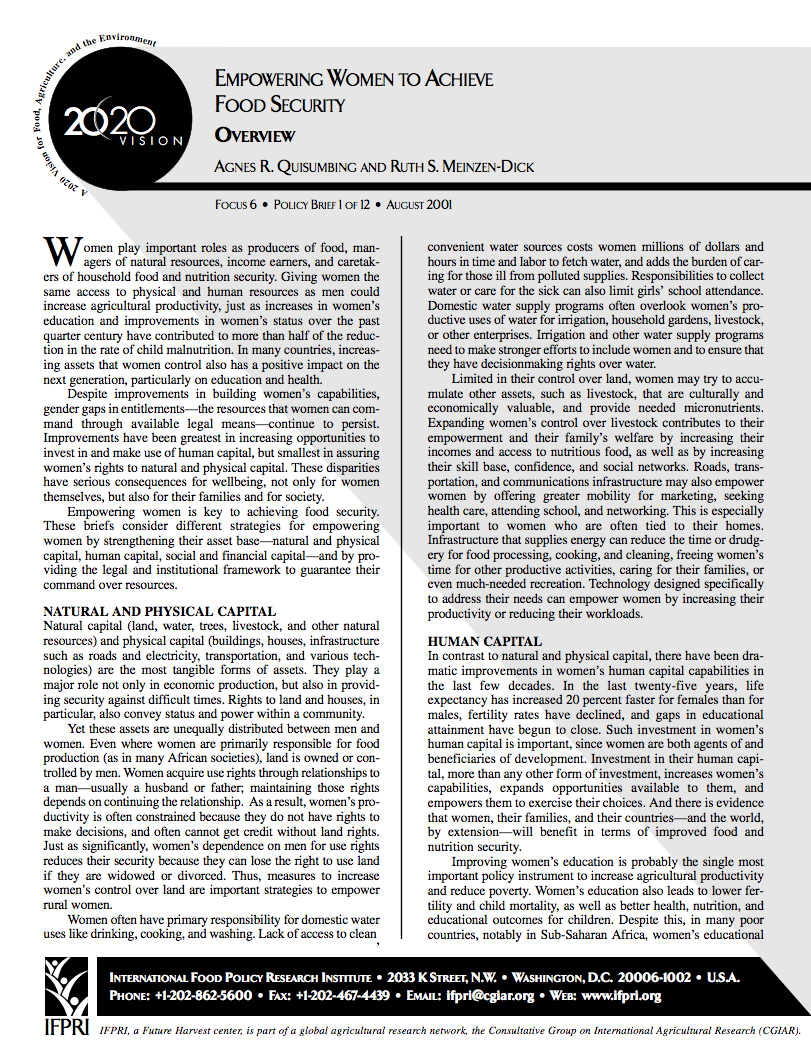Land Tenure, Title Deeds, and Farm Productivity in the Southern Province of Zambia: Preliminary Research Findings (Outline)
Addresses the research question, do different land tenure conditions affect farming systems, organisation and performance among Zambian small farmers, and if so, how? Discusses the widespread demand for title, even on customary lands, and concludes that this is a defensive measure, based on a desire for secure possession and for bequeathment and the protection of fixed investments.
Empowering women to achieve food security
Women play important roles as producers of food, managers of natural resources, income earners, and caretakers of household food and nutrition security. Giving women the same access to physical and human resources as men could increase agricultural productivity, just as increases in women’s education and improvements in women’s status over the past quarter century have contributed to more than half of the reduction in the rate of child malnutrition.
What Land Reform has meant and could mean to Farm Workers in South Africa
Covers introduction, farm workers in South Africa, tenure security for farm workers with a focus on ESTA – including the justice system, farmers’ responses and women farm workers; equity share schemes; rural housing and land redistribution; lessons to and from South Africa.
WTO African group : joint proposal on the negotiations on agriculture
The importance of agriculture in the economies of African countries cannot be overstated. Notwithstanding geographic and climatic diversity and other country specificities, the agricultural sector in African countries is the main source of rural livelihoods and, in general, employs more than two-thirds of the labour force. Agriculture generates more than a third of GDP in most African countries, and accounts for up to 40 per cent of exports. Most African countries have undertaken autonomous liberalization in agriculture.
Loi sur les améliorations structurelles.
La présente loi met en exécution, entre autres, la loi du 20 juin 2001 sur le développement rural et l’ordonnance 7 décembre 1998 sur les améliorations structurelles dans l'agriculture (ordonnance sur les améliorations structurelles) (OAS)5).
What's Wrong in Ranong
Ranong is the second largest Burmese community in Thailand, where many migrants work in the fishing and its related industries. However, the community has been hit by an economic downturn in part caused by the loss of fishing concessions from Burma.
Overestimating land degradation, underestimating farmers in the Sahel
This paper examines the evidence for land degradation in Burkina Faso, and argues that local farming practices are not as unsustainable and environmentally destructive as many reports suggest.Main findings of the study include:there is little evidence of widespread degradation of crop and fallow land in Burkina Faso; the low external input practices used by West African farmers are not leading to region wide land degradation processesa major reason for the overestimation of land degradation has been the underestimation of the abilities of local farmersthere is much more to soil and water co
Dampak krisis ekonomi Indonesia terhadap petani kecil dan tutupan hutan alam di luar Jawa
Twenty million people live in or near Indonesia' s natural forests. The country's humid tropical forests are primarily in Sumatra, Kalimantan, Sulawesi, and Irian Jaya. A devastating regional economic crisis that began in mid-1997 affected Indonesia more strongly than any other country in Asia. A random sample survey of 1050 households was conducted in six outer island provinces to understand the effects of the crisis on the well-being of forest villagers and on their agricultural and forest clearing practices.
Integrating improved germplasm and resource management for enhanced crop and livestock production systems: Project PE-5: Sustainable Systems for Smallholders: Annual Report 2000
The effect of Indonesia's economic crisis on small farmers and natural forest cover in the outer islands
Twenty million people live in or near Indonesia' s natural forests. The country's humid tropical forests are primarily in Sumatra, Kalimantan, Sulawesi, and Irian Jaya. A devastating regional economic crisis that began in mid-1997 affected Indonesia more strongly than any other country in Asia. A random sample survey of 1050 households was conducted in six outer island provinces to understand the effects of the crisis on the well-being of forest villagers and on their agricultural and forest clearing practices.
Farmers' laws and irrigation : water rights and dispute management in the hills of Nepal
The title of my Thesis is "Farmers' Laws and Irrigation: Water Rights and Dispute Management in the Hills of Nepal". This is based on a research I conducted in the Thulotar Kulo irrigation system in Nepal, during 1997 and 1998. Thulotar Kulo is a farmer-managed irrigation system.









